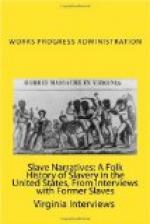Personal History of Informant
[TR: Repetitive information removed.]
1. Ancestry: Negro.
2. Place and date of birth: Richard (probably Richmond), Va., about 1828.
3. Family: unknown.
4. Places lived in, with dates: Has lived in Tampa since about 1870.
5. Education, with dates: Illiterate.
6. Occupations and accomplishments, with dates: None. Informant was a slave, and has always performed common labor.
7. Special skills and interests: none.
8. Community and religious activities: none.
9. Description of informant: Small, emaciated, slightly graying, very thin kinky hair, tightly braided in small pigtails. Somewhat wrinkled, toothless. Active for her age, does washing for a living.
10. Other points gained in interview: Strange inability of local Old Age Pension officials to establish right of claimants to benefits. Inexplainable causes of refusal of direct relief.
MAMA DUCK
Gwan away f’m here, Po’-Boy; dat gemmen ain’t gwine feed you nuthin. You keep yo’ dirty paws offen his close.
Come in, suh. Take care you don’t fall thoo dat ol’ po’ch flo’; hit ‘bout ready to go t’ pieces, but I ’way behind on rent, so I cain’t ask ‘em to have hit fixed. Dis ol’ house aint fitten fer nobody t’ live in; winder glass gone an’ roof leaks. Young folks in dese parts done be’n usin’ it fer a co’t house ’fore I come; you know—a place to do dey courtin’ in. Kep’ a-comin’ atter I done move in, an’ I had to shoo ’em away.
Dat young rascal comin’ yondah, he one of ’em. I claiah to goodness, I wisht I had a fence to keep folks outa my yahd. Reckon you don’t know what he be quackin’ lak dat fer. Dat’s ’cause my name’s “Mama Duck.” He doin’ it jus’ t’ pester me. But dat don’t worry me none; I done quit worryin’.
I sho’ had plenty chance to worry, though. Relief folks got me on dey black list. Dey give rashuns to young folks what’s wukkin’ an’ don’t give me nary a mouthful. Reason fer dat be ‘cause dey wanted me t’ go t’ de porehouse. I wanted t’ take my trunk ‘long, an’ dey wouldn’t lemme. I got some things in dere I be’n havin’ nigh onto a hunnert years. Got my ol’ blue-back Webster, onliest book I evah had, ‘scusin’ mah Bible. Think I wanna th’ow dat away? No-o suh!
So dey black-list me, ’cause I won’t kiss dey feets. I ain’t kissin nobody’s, wouldn’t kiss my own mammy’s.
I nevah see my mammy. She put me in a hick’ry basket when I on’y a day and a half old, with nuthin’ on but mah belly band an’ di’per. Took me down in de cotton patch an’ sot de basket on a stump in de bilin sun. Didn’t want me, ‘cause I be black. All de otha youngins o’ hers be bright.
Gran’mammy done tol’ me, many a time, how she heah me bawlin’ an’ go an’ git me, an’ fotch me to mammy’s house; but my own mammy, she say, tu’n me down cold.




